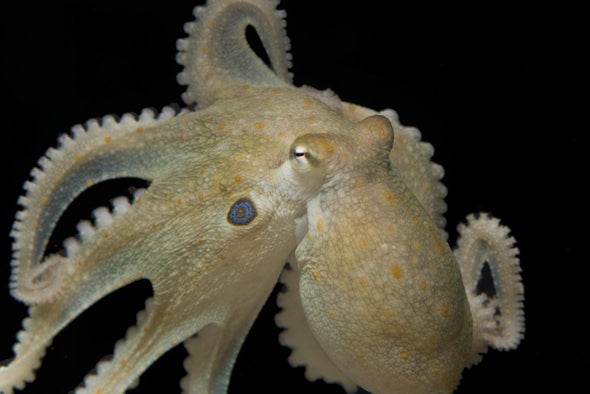(单词翻译:单击)
听力文本
This is Scientific American — 60-Second Science. I'm Annie Sneed.
When humans take the drug MDMA—best known as ecstasy—they feel a deeper connection to others—emotionally and physically. Because MDMA affects serotonin, a nervous system chemical.
"Serotonin is one of the oldest neurotransmitters." Gul Dolen, an assistant professor of neuroscience at Johns Hopkins University who studies social behaviors.
"It's been implicated in all kinds of functions, lots of them having nothing to do with social, and so we wanted to know, how long ago was serotonin's function really about encoding social behaviors?" So Dolen and her colleague did what any scientist would do: they gave MDMA to octopuses.
Octopuses are asocial creatures, and their last common ancestor with us lived more than a half billion years ago. Which made them a good test subject for the question at hand.
The researchers set up a simple test: "There's a large chamber, which is basically an aquarium tank, divided it into three chambers. On one side, we put a little overturned flowerpot that's clear and plastic and has lots of holes in it. Underneath that overturned pot, we have a toy object, and on the other side, we have another overturned orchid pot, but this one has an octopus in it."

The researchers put an octopus in the middle chamber and watched it swim around for thirty minutes. They measured how much it interacted with on e side of the chamber—the one with the other octopus—versus the chamber with the toy. Then they soaked the test octopus in a beaker of MDMA, put it back in the aquarium and watched it for another thirty minutes. And what the researchers saw was weirdly similar to a human on MDMA:
"Before they received MDMA when they were interacting, they're very reserved, even when they're spending time in the social side, they are sort of mashing their bodies up against the side wall, and extending only one arm out to touch the flowerpot, and very tentatively touching with one arm... After MDMA, all of the animals spent significantly more time in the side that had the other octopus in it. What's more is that the quality of their social interactions changed—they were much more loose in their body posturing, they were allowing several arms to touch the sides of the flowerpot, sort of hugging around the flowerpot, and exposing the bottom part of their body to the other octopus which, the way they were doing that, was suggesting they were exploring rather than any kind of aggressive posturing."
These observations indicate that serotonin began playing a role in animals' social behavior more than 500 million years ago.
Dolen says these findings could help scientists better understand social behavior, as well as give clues about possible treatments for serotonin-related human conditions like schizophrenia and PTSD.
Meanwhile, we've learned—not surprisingly, given their anatomy—that octopuses are excellent huggers.
Thanks for listening for Scientific American — 60-Second Science. I'm Annie Sneed.
参考译文
这里是科学美国人——60秒科学。我是安妮·斯尼德。
人类服用MDMA(亚甲基二氧甲基苯丙胺)——最为熟知的名字是摇头丸——之后,会感觉到自己与他人在情感和身体上产生更深的联系。这是因为MDMA会影响一种名为“血清素”的神经系统化学物质。
“血清素是最古老的神经递质之一。”约翰·霍普金斯大学研究社会行为的神经科学助理教授古尔·多伦说到。
“血清素参与了各种各样的功能,其中许多与社交无关,所以我们想知道,血清素真正与编码社交行为有关的功能存在了多久?”因此,多伦及其同事做了任何科学家都会做的事情:他们喂章鱼吃了摇头丸。
章鱼是不喜欢社交的生物,它们与人类最后的共同祖先生活在5亿多年前。这使章鱼成为研究眼前这一问题最合适的测试对象。
研究人员设置了一个简单的测试:“我们找了一个巨型箱体,基本上来说就是一个水族箱,然后将其分为三部分。在一边,我们放了一个倒扣的塑料小花盆,上面有很多洞。我们在倒扣的花盆下面放了一个玩具,然后在另一边,我们也放了一个倒扣的兰花花盆,不过花盆里面放的是真章鱼。”
研究人员将一只章鱼放在水族箱中间的房间,观察它大约30分钟内的游动情况。他们测量了它与另一只章鱼和玩具的互动程度。随后,研究人员将接受测试的两只章鱼浸入装有摇头丸的烧杯中,然后将其放回水族箱,再观察30分钟。研究人员发现,章鱼的表现与人类服用摇头丸后的情况惊人地相似:
“在接触摇头丸前,章鱼的互动相当保守,即便花时间社交,它们也会把身体靠在水族箱壁上,只伸出一只触手触碰花盆,而且是短暂地触碰。但在服用摇头丸后,两只章鱼呆在一起的时间明显增加。更重要的是,两只章鱼的社交互动质量发生了变化——它们的身体姿态放松了很多,会用多只触手触碰花盆壁,就像是拥抱花盆一样,它们还向对方展露了身体底部——这表明它们在互相探寻,而不是摆出任何进攻性姿势。”
这些观察结果表明,血清素早在5亿多年前就开始影响动物的社交行为了。
多伦表示,这些发现有助于科学家更好地理解社交行为,同时对于与血清素有关的精神分裂症或创伤后应激障碍等人类疾病,这些发现也可以为可能的治疗方案提供线索。
同时,我们还了解到,得益于身体结构,章鱼可是极优秀的拥抱能手,而这一点不足为奇。
谢谢大家收听科学美国人——60秒科学。我是安妮·斯尼德。
译文为可可英语翻译,未经授权请勿转载!
重点讲解
重点讲解:
1. be implicated in 密切关联的;牵涉其中的;
It is thought that this virus is implicated in the development of a number of illnesses.
这种病毒被认为与数种疾病的发生密切相关。
2. all kinds of 各种类型的;五花八门的;
They sell all kinds of things.
他们出售各种各样的东西。
3. at hand (在时间或距离上)接近;
Please concentrate on the business at hand and don't drag in irrelevant issues.
请你集中谈这件事,不要牵扯其他问题。
4. interact with 相互交流;相互沟通;
After initiation, the youths started to interact with the older members.
入会仪式后,这些小伙子与老成员开始互动。


